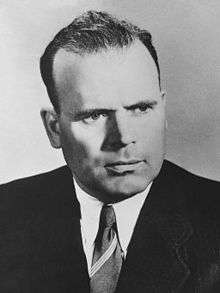Chivu Stoica
Chivu Stoica (the family name being Chivu;[1][2] 8 August 1908 – 18 February 1975) was a leading Romanian Communist politician, who served as 48th Prime Minister of Romania.
Chivu Stoica | |
|---|---|
 | |
| President of the State Council | |
| In office 24 March 1965 – 9 December 1967 | |
| Prime Minister | Ion Gheorghe Maurer |
| Preceded by | Gheorghe Gheorghiu-Dej |
| Succeeded by | Nicolae Ceaușescu |
| President of the Council of Ministers | |
| In office 21 October 1955 – 21 March 1961 | |
| President | Petru Groza Ion Gheorghe Maurer |
| Preceded by | Gheorghe Gheorghiu-Dej |
| Succeeded by | Ion Gheorghe Maurer |
| First Vice President of the Council of Ministers | |
| In office 20 August 1954 – 4 October 1955 | |
| Prime Minister | Gheorghe Gheorghiu-Dej |
| Minister of Industry[a] | |
| In office 15 April 1948 – 31 May 1952 | |
| Prime Minister | Petru Groza |
| Succeeded by | Carol Loncear |
| Personal details | |
| Born | 8 August 1908 Smeeni, Buzău County, Kingdom of Romania |
| Died | 18 February 1975 (aged 66) Bucharest, Socialist Republic of Romania |
| Political party | Romanian Communist Party |
| a. ^ Minister of Metallurgy and Chemical Industries from 23 November 1949 | |
Early life
Stoica was born in Smeeni, Buzău County, the sixth child of a ploughman.[3] At age 12 he left home, and started working as an apprentice at Căile Ferate Române, the state railway corporation. In 1921, he moved to Bucharest, where he worked as a boilermaker at the Vulcan, Lemaître, and Malaxa companies. There he met Gheorghe Vasilichi, who recruited him into the Communist Party.[3]
Career

In spring 1931, Stoica started working for the Grivița Railway Yards, where he met Gheorghe Gheorghiu-Dej, Vasile Luca, and Constantin Doncea; together, they started organizing a strike.[3] On August 20, 1934, he was sentenced to 15 years of prison for his role in the Grivița Strike of 1933.[4] At Târgu Jiu prison, he was close to Gheorghiu-Dej, who may have wanted Stoica to be his successor as General Secretary.
He was a member of the Central Committee of the Romanian Workers' Party from 1945 to 1975, and a member of the Politburo. He served as Prime Minister of Romania between 1955 and 1961 and as President of the State Council of Romania (de facto head of state) from 1965 until 1967.
In his later years, Stoica fell out of favour with Nicolae Ceaușescu and his wife Elena.
Death
His death, by a hunting rifle bullet to the head, was ruled a suicide.[5]
Family
His first wife was Ecaterina (b. Klein),[2] and his second one was Maria (b. Manolescu), an engineer, with whom he had a daughter.[6]
References
- Tismăneanu, Vladimir. "Balta fetidă a minciunii: Nepmanul Ponta intre bolșevism și peronism" (in Romanian). Retrieved June 12, 2014.
- "Dosarele de cadre ale Ceaușeștilor" (in Romanian). December 18, 2013. Retrieved June 12, 2014.
- (in Romanian) Paula Mihailov Chiciuc, "Din înaltul ordin al partidului" Archived 2014-03-02 at the Wayback Machine, Jurnalul Național, July 18, 2006
- (in Romanian) Stelian Tănase, Dej – omul resentimentului Archived 2007-10-10 at the Wayback Machine, from Magazin Istoric
- (in Romanian) Chivu Stoica Archived 2012-03-19 at the Wayback Machine. iiccr.ro
- Betea, Lavinia (21 May 2013). ""Sinuciderea" lui Chivu Stoica, consilierul Pacepa și traducătorul "savantei" Lenuța". Adevărul. Retrieved June 12, 2014.
External links
| Wikimedia Commons has media related to Chivu Stoica. |
- "Final Report of the Presidential Commission for the Study of the Communist Dictatorship in Romania" (PDF) (in Romanian). 2006. pp. 649–650.
- Betea, Lavinia (January 15, 2007). "Zvonurile 'epocii de aur'" ["Rumors from the 'Golden Age']. Jurnalul Național (in Romanian). Retrieved June 8, 2020.
| Party political offices | ||
|---|---|---|
| Preceded by Gheorghe Gheorghiu-Dej |
President of the State Council 24 March 1965–9 December 1967 |
Succeeded by Nicolae Ceaușescu |
| Preceded by Gheorghe Gheorghiu-Dej |
Prime Minister of Romania 21 October 1955– 21 March 1961 |
Succeeded by Ion Gheorghe Maurer |
